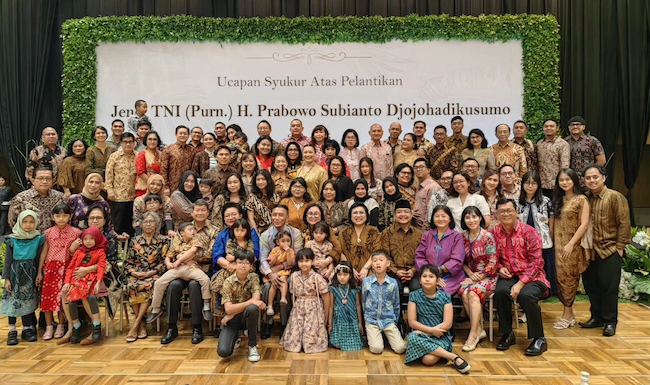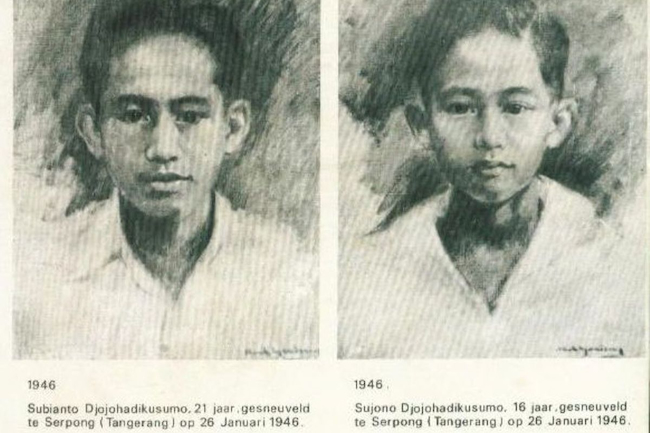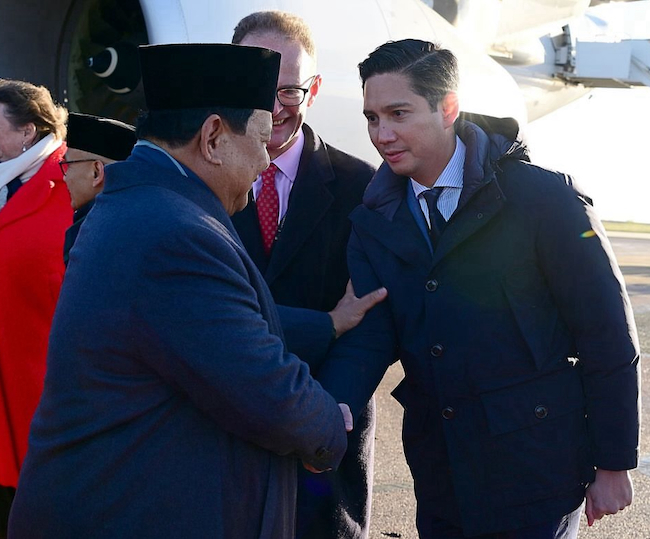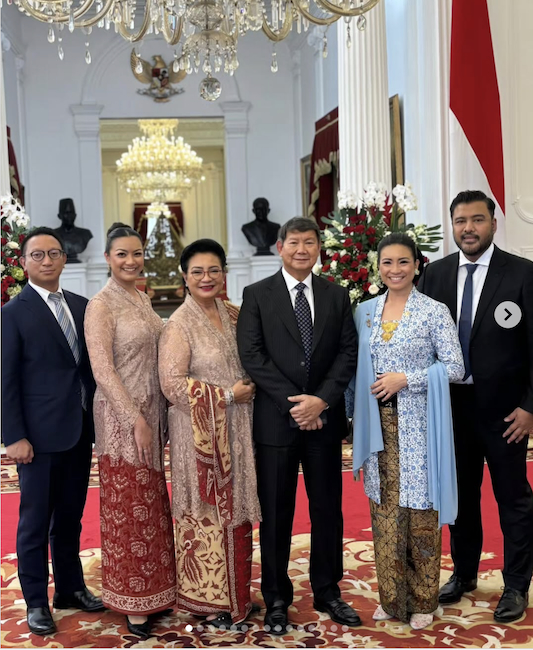The Djojohadikusumo family has claimed the ultimate prize, and its next generation are going to make the most of it
Jemma Purdey
Dressed in celebratory batik, the family gathered in the nondescript hotel ballroom resembles any other coming together for an anniversary or reunion. But this was no ordinary family. And the celebration was marking something altogether extraordinary. The Djojohadikusmo family had finally reached its zenith. A family deeply connected to Indonesia's nationalist struggle, nation building projects, and oligarchic politics had achieved its ultimate and long desired prize, the presidency.
The story of this family dynasty is well known and in recent years has been told often; not least by the family’s political vehicle, the Gerindra party and its marketers, since it was established in 2008. The brainchild of Prabowo Subianto’s younger brother Hashim, the party came to life after the former military general’s path to a political career through the traditional parties, hit a dead end in the early 2000s.
But Prabowo’s ambitions have always been a shared family endeavour. Two previous attempts at the presidency, and one as Megawati's running mate for vice president, came with a huge price tag understood to have been shouldered largely by his billionaire brother, Hashim, but they were strongly and loyally backed by many other family members, including an energetic and seemingly entitled next generation.
Elites in and out of exile
Prabowo Subianto and Hashim Sujono are the sons of Soemitro Djojohadikusumo, an economist who served as a minister in both Sukarno and Suharto-led governments. He was a highly respected technocrat and successful businessman in his own right. Adept at negotiating around obstacles, personalities and ideological differences, his passage into exile during Sukarno's Guided Democracy period in the late 1950s meant his four children had an international and cosmopolitan upbringing alongside the children of the wealthy and powerful from the Middle East, Asia, Europe, and America. In their nine years in exile, the family moved many times, with Prabowo and Hashim, together with their older sisters Bianti and Maryani, attending schools in Malaysia, Singapore, Switzerland and the United Kingdom.

Upon their return to Indonesia in the late 1960s, Soemitro’s economic expertise was in high demand in Suharto’s development-focused New Order, and he was quickly assigned key roles in the government and brought into the Cendana inner circle. Prabowo has explained that his own decision to enter the military academy at Magelang was deeply steeped in his family’s legacy and narrative of service, what he and his brother term ‘noblesse oblige’.
Prabowo’s marriage to Suharto’s daughter Siti Hediati Hariyadi (Titiek) in 1983 and the birth of their son Didit a year later, ensured these powerful families were forever bonded. Even after the couple divorced in 1998, they appeared to remain close and increasingly so in recent years. Previously an elected member of the DPR (Dewan Perwakilan Rakyat, House of Representatives) representing Golkar (2014-2018), in 2024 Titiek ran as a Gerindra candidate and was elected to the DPR (2024-2029) and subsequently chosen to Chair Commission IV with oversight of Agricultural, Forestry and Maritime Affairs.
A history of patriots
While their father was undoubtedly well-known and well-regarded, in the early years of Gerindra, as they sought to establish a strong family narrative around the party, Hashim, Prabowo and their team of political strategists chose instead to focus a narrative on their grandfather, Margono, and great uncles, Soemitro’s younger brothers, Subianto and Sujono. Founder and first president of the Bank Negara Indonesia in 1946, and with lineage that family lore traces back to Sultan Agung and Diponegoro, Margono is greatly revered as the family’s patron. For the strategists it was his proximity to the formation of the republican government and its first national institutions that provided a dynastic story founded in the very origins of the republic.

During the Japanese Occupation and early revolutionary period, as Margono worked in various important positions for the fledgling Republican government, his three older children, Soemitro and sisters Sukartini and Miniati, were sent to the Netherlands to study.
The two younger brothers remained in Jakarta where Subianto attended the elite medical school, Stovia, and Sujono was still in high school. Shortly after the declaration of independence on 17 August 1945, Subianto, aged 21 years, joined the newly established Military Academy in Tangerang. Sujono, aged only 16, joined him. On 25 January 1946 the brothers were killed together with more than 30 others in an attempted raid on a weapons post south of Tangerang.
As I have written about elsewhere, in establishing Gerindra and its foundation narrative, as revolutionary heroes and martyrs, the brothers/uncles became the centrepiece of a family story based on notions of service, patriotism and sacrifice to the nation. Significantly, it is also a narrative that the next generation of Djojohadikusmo family members have committed to. Hashim's oldest daughter, Rahayu Saraswati (Sara), an actress and one of the stars of the family-produced film trilogy, Merah Putih (a retelling of this family story), told the Successors documentary series in 2013, “The responsibility I have is definitely to represent my family in a manner that is acceptable and that brings honour….That no matter what, people will remember us as those who fight for the country, even from my ancestors and that runs through our blood.”
Following Prabowo’s election victory in February and their own individual successes as Gerindra candidates, several members of this generation, including Sara, are now in positions to reap significant benefits and exert their own influence and agendas.
#NextGen
Among the family members celebrating together on the evening of the inauguration on 20 October 2024, was Prabowo’s nephew. Thomas Djiwandono is the eldest son of his sister, Bianti and her husband, Sudrajad Djiwandono, an economist, academic and former Governor of the Bank of Indonesia. It had come as a surprise to many observers when, a few months earlier, Thomas had been appointed Second Deputy Minister for Finance as part of the agreement between the Jokowi and Prabowo camps to provide a smooth transition to the new government. In October 2024, he was confirmed in this position under the reappointed Minister for Finance, Sri Mulyani Indrawati. In general, though there may have been some murmurs about nepotism, commentators pointed to Thomas' international education and impressive pedigree and largely approved of his appointment. Prior to his promotion into the Finance Ministry, Thomas was Deputy CEO of Hashim’s Ansari Group and has served as the treasurer of the Gerindra party since 2014.

Also celebrating was Thomas’ younger brother, Budisastro Djiwandono, re-elected for a second term in the DPR representing East Kalimantan, a position he has held since 2017. Newly married and newly converted to Islam, Budi had recently been mentioned as a possible candidate to run in the Jakarta gubernatorial race. In the 2024-2029 DPR he was appointed Deputy Chair for Commission I, responsible for oversight of Defence, Foreign Affairs, Digital Communication and Intelligence, and accompanied Prabowo on his inaugural presidential visit to the United States in mid-November 2024. Budi is also an avid basketballer and promoter of the game in Indonesia. He was recently appointed president of the Central Basketball Association of Indonesia.
Likewise, the aforementioned Sara, has taken up a seat in the DPR representing Central Java IV. This will be her second term, having served in the DPR in the period 2014-2019. An attempt to shift her to a Jakarta seat went badly wrong in the 2019 legislative election and Sara had vowed to walk away from politics entirely. This turned out to be short-lived and the mother of three was enticed back into the family political business less than a year later, and appointed a deputy chair of Gerindra. As well as being an actress, Sara is an activist and philanthropist, and is particularly active in the party’s youth arm, and on issues related to women, children, health, and disability. Her husband, Harwendro Adityo Dewanto, ran without success as a Gerindra candidate for Bangka-Belitung in the 2024 DPR election.

Like Sara, in 2014 her brother Aryo was elected to the DPR, representing a Jakarta electorate, but did not run again in 2019. Unlike Sara, Aryo has not returned to a career in politics, but instead is working in the other side of the family business, currently heading up a tin mining company within the Arsari Group. For the time being it appears that Aryo, under the watchful guidance of his father, will remain committed to ensuring the family businesses make the most of their direct line to the highest office in the country.
Hashim’s ambitions for Sara or indeed for any of his children, remain unknown. Hashim’s youngest daughter, Sitie Indrawati is yet to enter politics. After finishing her studies in the US a few years ago, she has worked at Arsari Group and with her mother’s philanthropical foundation. Not surprisingly, Hashim has himself already assumed a central role alongside his brother, and will likely take up various ‘Special Envoy’ roles. The first of these was as Indonesia’s representative at COP 29 in Baku in November 2024.
Although the family is well-known for its multi-faith and pluralist make-up and sometimes lauded for it (Hashim and wife Anie and their children are Protestant, Bianti is Catholic, and Prabowo is Muslim), it is also well understood that in Indonesian politics their religion imposes limits on just how high Sara’s or Thomas’ personal ambitions, for example, might go. Interestingly, Budi’s conversion to Islam in late 2023, to marry his now wife, Mila Gunawan, immediately raised his profile, potentially opening up a new line of succession.
The normalisation of dynastic politics
The Djohadikusumo’s are not ground breakers. It can be said that they have merely followed a well-worn and proven path to electoral victory in post-reformasi politics. As a sign of just how normal dynastic politics in Indonesia has become, questions routinely directed to family members in previous elections about their elite status and wealth largely evaporated in the 2024 campaign. In the past, Sara, Aryo, Hashim and Prabowo himself were questioned about nepotism and privilege and regularly went to great lengths to justify their family's position, describing it as a selfless act based on noblesse oblige. Ironically, so intense was the focus on and criticism of Prabowo’s running mate, Gibran Rakabuming Raka, and the questionable methods initiated by his father, President Jokowi, to enable his nomination and protect their dynastic ambitions, that none of that was needed this time around.

Sixteen years of sophisticated Gerindra campaigns, including three presidential elections, meant that when the 2024 campaign came around, an understanding of the family and what it stood for was well entrenched in the Indonesian psyche. The campaign team had no doubt learnt from past failed attempts and shifted their focus away from Prabowo’s strongman image and military legacy.
In what many commentators have called a work of marketing genius, the 2024 campaign repackaged Prabowo as a cuddly, joget dancing grandfather figure. Again, the ‘family’ played a central role in image-building, but now reflected Prabowo’s status as an elder, a great uncle, a patron. The support of his nieces, nephews and grand nieces and nephews enhanced this image. Young voters were drawn to him, arguably seeing him as a father figure, as someone whom they could trust to lead the nation.
In a first, Prabowo’s ex-wife and now Gerindra parliamentarian, Titiek, and their Paris-based son Didit featured prominently in the 2024 campaign. At the Gerindra election night party, as the camera panned the front pews of party leaders and celebrity hangers-on, the crowd’s loudest and most enthusiastic applause was for Prabowo’s ex-wife, seated alongside her son. Images of the family of three breaking fast together during Ramadan a few weeks later set the internet alight. The rejoining of the Suharto and Djojohadikusumo families was viral gold.
The success of this elite family follows the rise and rise of dynastic politics in Indonesia over the past decades. As some commentators have argued, not only is the political family now seen as normal, it is arguably also a ticket sought after by voters. Some may point to Indonesia’s feudal past for clues as to why, but the Djojohadikusumo’s story reveals how wealth combined with savvy political strategy and the public’s fascination with dynastic families aligned with notions of nationalism, stability and even altruism, are carefully cultivated.
Jemma Purdey is Coordinating Editor of Inside Indonesia. She is co-author with Antje Missbach and Dave McRae of Indonesia: State and Society in Transition (2020: Lynne Reinner).











